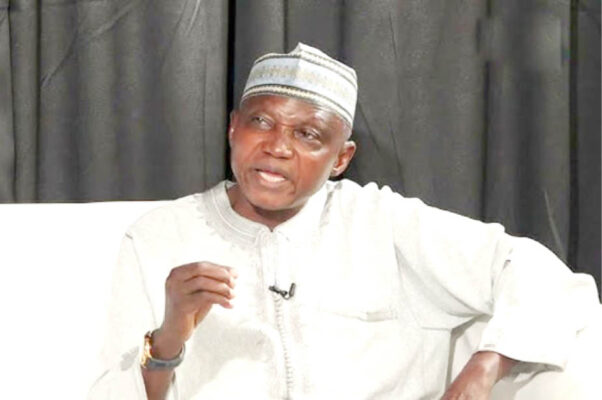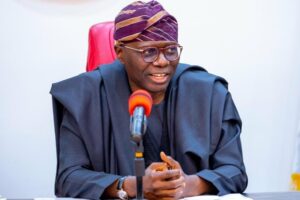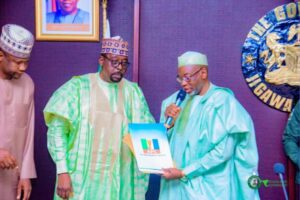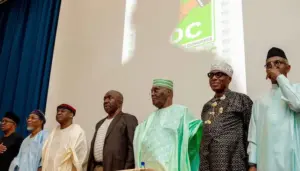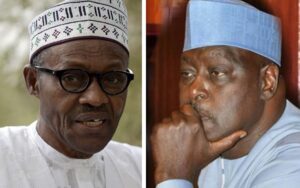Nigeria’s political elite converged on Abuja on Wednesday for the launch of ”According to the President: Lessons from a Presidential Spokesman’s Experience”, a memoir by Garba Shehu, former presidential spokesperson.
The high-profile event featured notable attendees, including former Vice President Atiku Abubakar and former President Muhammadu Buhari, turning the book launch into a rare reunion of key political power brokers.
Originally billed as a deep dive into the inner workings of the presidency, the gathering quickly took on the air of a political homecoming. Former ministers, top government operatives, and prominent journalists used the event as an opportunity to reconnect, exchange handshakes, and reminisce about their years in power.
However, amid the camaraderie, a controversial remark from former Secretary to the Government of the Federation (SGF), Boss Mustapha, sparked fierce debate. Mustapha stated that Buhari had already amassed “12 million-plus votes” before the historic merger that formed the All Progressives Congress (APC) in 2013, adding that the coalition only contributed an additional 3.2 million votes to Buhari’s tally in the 2015 presidential election.
Though Mustapha did not mention President Bola Ahmed Tinubu by name, the comment was widely interpreted as an attempt to downplay Tinubu’s role in Buhari’s 2015 victory. The statement drew swift backlash from Tinubu loyalists, who viewed it as a subtle but pointed political jab.
In the wake of the media storm, Garba Shehu moved to calm tensions. He described the headlines as “mischief,” insisting that both Buhari and the APC leadership had consistently acknowledged the joint efforts that led to the 2015 electoral success.
“No one is claiming sole ownership of that victory,” Shehu told journalists. “President Buhari himself has often credited the coalition as the decisive factor in that election.”
Shehu’s book adds to the growing collection of insider accounts from the Buhari era, following the earlier publication of Working with Buhari by fellow former spokesperson Femi Adesina. Shehu maintained that more narratives are needed to fully document the complex legacy of Buhari’s eight-year presidency.

“There can never be too many books about an administration that shaped Nigeria for eight years,” Shehu said. “We owe it to the public and future generations to document our experiences—both the good and the bad.”
Read Also
He described the book as more than just a memoir, calling it a resource for young journalists, political aides, and students of public relations. “This book isn’t just about preserving history—it’s about preparing those who will walk this path after us,” he said.
In response to suggestions that his memoir was merely an exercise in image management for Buhari, Shehu firmly dismissed the claim. “My loyalty was never about spin. It was rooted in trust and duty,” he remarked.
Shehu also addressed his political trajectory—from Atiku Abubakar’s media aide during the Obasanjo administration to serving as Buhari’s spokesperson—saying it reflected Nigeria’s evolving political landscape rather than opportunism.
“People forget that Atiku and Buhari were once on the same side in 2015,” he noted. “What matters is how you serve your principal with honesty and professionalism.”
Atiku’s presence at the launch added another layer to the conversation about shifting allegiances in Nigerian politics. Shehu praised their continued cordiality, stressing that political competition need not erase personal relationships.
When asked whether he would support Atiku if the former vice president contests the 2027 election, Shehu remained non-committal but clear in his stance. “One master at a time,” he replied, affirming his ongoing loyalty to Buhari.
He also declined to publicly assess President Tinubu’s current media aides, stating instead that he offers advice to them privately. “They know my number—I speak when I’m needed,” he said.
As the event drew to a close, Shehu expressed pride in his contribution to Nigeria’s historical record. “We live in a country that forgets too easily. If this book helps preserve our national memory—warts and all—then it has served its purpose,” he concluded.
The memoir’s release comes at a time of renewed debate over political alliances, election histories, and the evolving power dynamics within the APC—ensuring that Shehu’s reflections will remain part of the national conversation for some time to come.

